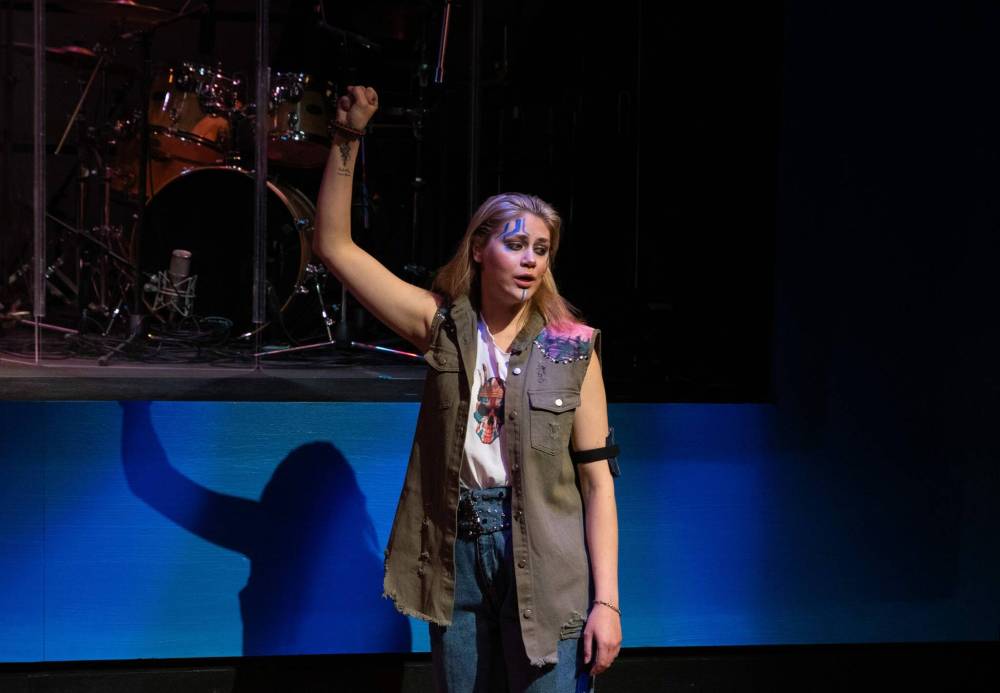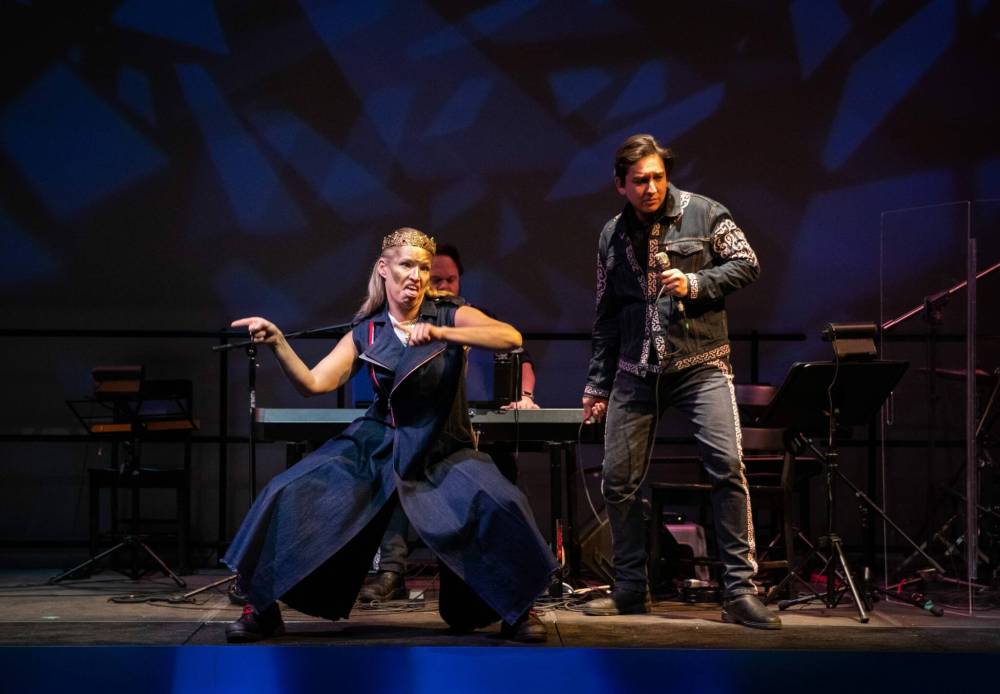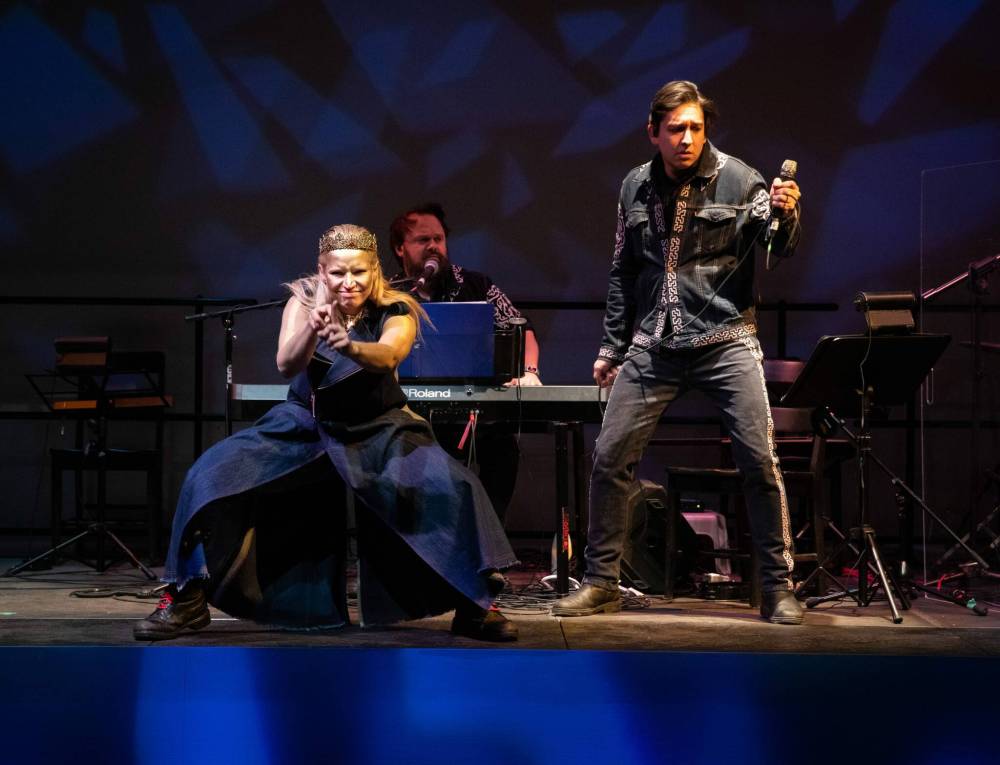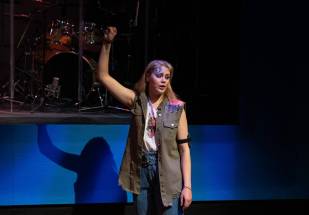Found in translation Musical production of ancient Greek tragedy is speaking our language
Read this article for free:
or
Already have an account? Log in here »
To continue reading, please subscribe:
Monthly Digital Subscription
$0 for the first 4 weeks*
- Enjoy unlimited reading on winnipegfreepress.com
- Read the E-Edition, our digital replica newspaper
- Access News Break, our award-winning app
- Play interactive puzzles
*No charge for 4 weeks then price increases to the regular rate of $19.00 plus GST every four weeks. Offer available to new and qualified returning subscribers only. Cancel any time.
Monthly Digital Subscription
$4.75/week*
- Enjoy unlimited reading on winnipegfreepress.com
- Read the E-Edition, our digital replica newspaper
- Access News Break, our award-winning app
- Play interactive puzzles
*Billed as $19 plus GST every four weeks. Cancel any time.
To continue reading, please subscribe:
Add Free Press access to your Brandon Sun subscription for only an additional
$1 for the first 4 weeks*
*Your next subscription payment will increase by $1.00 and you will be charged $16.99 plus GST for four weeks. After four weeks, your payment will increase to $23.99 plus GST every four weeks.
Read unlimited articles for free today:
or
Already have an account? Log in here »
Hey there, time traveller!
This article was published 16/11/2022 (1118 days ago), so information in it may no longer be current.
It’s literally been thousands of years since Sophocles sat down and wrote Antigone, one of the cornerstones of classic Greek drama and all of theatre. It was performed for the first time in 441 BC: Were any of you there?
Theatre Preview
Antigone
Sick + Twisted and AA Battery
• Théâtre Cercle Molière, 340 Provencher Blvd.
• Opens Thursday, runs to Nov. 27
• Tickets: Pay-what-you-can, up to $40, at wfp.to/antigone
Since then, Antigone — a story of a woman asserting her independence in a world where that could mean death — has been performed thousands upon thousands of times.
But it has never been done like the version premièring at Théâtre Cercle Molière Thursday night.
The production, mounted by Sick + Twisted Theatre, is an experiment in translation, ability and expectation — a modern disco-rock opera performed in English and American Sign Language, brought to life by a cast of deaf, blind, disabled and non-disabled artists, with a soundtrack by local band the Mariachi Ghost.
“It’s every actor’s dream to be in a production like this,” says Sarah Luby, the Winnipeg actor who appears in the titular role, wearing her costume of combat boots, knee-length jean shorts and a bejewelled denim vest.
During a media call, with news cameras rolling, Antigone is singing, while her evil uncle Kreon struts nearby. Kreon, played by Joanna Hawkins, joins in the duet, singing along without making any sound.
That’s because Hawkins, who comes from the Polish burg of Lodz, is deaf. When Kreon sings, the voice the audience hears comes from Matthew Fletcher, who stands off to the side and barks his displeasure with Antigone into a standup microphone.
But one is not drawn to ever look at Fletcher, because Hawkins’ movement — of her hands, her eyes, her entire body — does something remarkable: it translates a translation of a classic play into an entirely new language: it is so meta it could give you a headache.
JESSICA LEE / WINNIPEG FREE PRESS Sarah Luby plays the title role of Antigone in Sick + Twisted’s musical version of the Sophocles tragedy.
But it doesn’t, because Hawkins worked for several months to translate the play’s text — itself a translation of Sophocles written by the Canadian intellectual Anne Carson — into an understandable physical dialect using ASL signs. Through collaboration with director Arne Macpherson, Hawkins was able to transmit Kreon’s narcissism and anger from concept to practice.
“I was able to see the feelings, the moods, the vibes and the emotions in the scenes, and sometimes, that would affect the sign choices I made,” says Hawkins, whose hearing capacity reaches about 70 decibels. “(Rehearsal) helped me clean up my translation, because it is very important that all concepts are clearly conveyed so everyone in the audience can understand.”
In most cases, that is not true for theatregoers with varying levels of hearing loss. But Sick + Twisted, whose mandate is to create work exploring the experience of living with disabilities, has shifted that narrative. Whereas most productions have historically occurred in the dominant tongue of the audience, this version of Antigone presents an egalitarian adaptation — with visual assistance, subtitles, ASL interpretation and musical accompaniment.
JESSICA LEE / WINNIPEG FREE PRESS Joanna Hawkins (left) plays Kreon with accompaniment from Marachi Ghost’s Jorge Requena Ramas.
Physical conditions that society has incorrectly categorized as differences and limitations, this production reframes as creative and personal strengths.
There are multiple languages being spoken at once, according to Jorge Requena Ramos and Tim Friesen of the Mariachi Ghost, who capture different characters with different musical styles. Kreon, for example, is flamboyant and boastful, giving his songs a mercurial vibe, as in Freddie. Antigone’s songs represent a suppressed but building scream, and sound a bit more like Donna Summer.
“Sophocles would have written this to music,” Requena Ramos says. But not like this.
The number that Luby and Hawkins run through several times for the news cameras is a swaggering anthem that sounds like Wayne Fontana’s The Game of Love, mixed with any song by Donovan, diffused through the Mariachi Ghost’s distinct musical voice.
JESSICA LEE / WINNIPEG FREE PRESS 
Hawkins and Luby both say it was a pleasure to see how all the unique voices and abilities on set mixed together, especially when backed by the live soundtrack provided by the Mariachi Ghost.
During rehearsals, Hawkins carried a Bluetooth speaker so she could feel the musical vibrations, allowing her to respond and react to the shifts in key, tempo and rhythm, and synch her movements to the sounds.
“I think it’s important to note that not every person has the same amount of hearing loss,” Hawkins says through an ASL interpreter. “But the main thing is that we can feel vibrations. I can feel the bass vibrating through the stage.”
ben.waldman@winnipegfreepress.com

Ben Waldman covers a little bit of everything for the Free Press.
Our newsroom depends on a growing audience of readers to power our journalism. If you are not a paid reader, please consider becoming a subscriber.
Our newsroom depends on its audience of readers to power our journalism. Thank you for your support.





